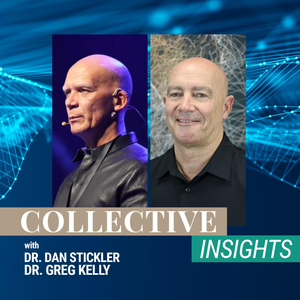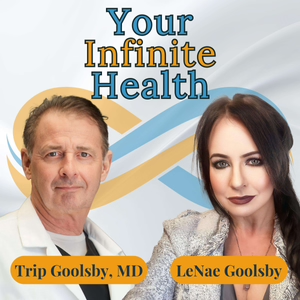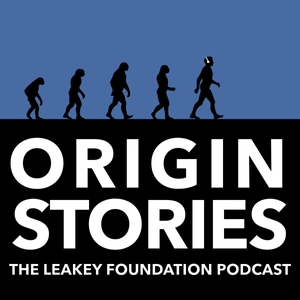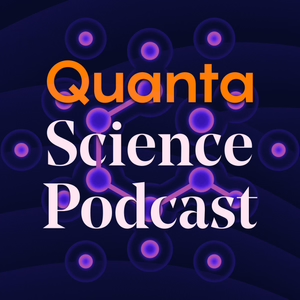
#4 Paul Middlebrooks: BrainInspired & Podcasting
10/03/23 • 47 min
An episode with my favourite podcast host, Paul Middlebrooks. Paul and I met in Berlin, and talked about his journey away from (and back into) academia and why he started his podcast BrainInspired. Yes, there is a lot of podcast meta-talk in this episode. For example, how science podcasts give you a glimpse into another field (as an outsider) and some advice for fellow podcast hosts. We also get into productivity, self-learning and some big-picture questions on what's holding neuroscience back.
For Apple Podcast users, find books/papers links at: https://akseliilmanen.wixsite.com/akseli-ilmanen/post/pod04
- Paul's Podcast BrainInspired
- His NeuroAI course with topics ranging from the history of ANNs to explaining variational autoencoders
- Twitter: @pgmid
- Epistimones podcast by Paco Chow and Megan Lee
- My Twitter @akseli_ilmanen
- Email: akseli.ilmanen[at]gmail.com
- Brain Space Time Podcast, my blog, other stuff
- Music: Space News, License: Z62T4V3QWL
Timestamps:
(00:00:00) - Intro
(00:01:51) - Interesting conversations Paul had at the conference
(00:07:57) - The why and how of podcasting
(00:11:16) - Changing one's mind in science
(00:19:34) - Paul's NeuroAI course
(00:20:46) - Podcasts for self-learning & productivity fallacies
(00:26:15) - Podcast advice
(00:30:58) - Paul is back in academia
(00:38:48) - Neuroscience needs theory (beyond manifolds)
(00:45:50) - Saying thank you to Paul
An episode with my favourite podcast host, Paul Middlebrooks. Paul and I met in Berlin, and talked about his journey away from (and back into) academia and why he started his podcast BrainInspired. Yes, there is a lot of podcast meta-talk in this episode. For example, how science podcasts give you a glimpse into another field (as an outsider) and some advice for fellow podcast hosts. We also get into productivity, self-learning and some big-picture questions on what's holding neuroscience back.
For Apple Podcast users, find books/papers links at: https://akseliilmanen.wixsite.com/akseli-ilmanen/post/pod04
- Paul's Podcast BrainInspired
- His NeuroAI course with topics ranging from the history of ANNs to explaining variational autoencoders
- Twitter: @pgmid
- Epistimones podcast by Paco Chow and Megan Lee
- My Twitter @akseli_ilmanen
- Email: akseli.ilmanen[at]gmail.com
- Brain Space Time Podcast, my blog, other stuff
- Music: Space News, License: Z62T4V3QWL
Timestamps:
(00:00:00) - Intro
(00:01:51) - Interesting conversations Paul had at the conference
(00:07:57) - The why and how of podcasting
(00:11:16) - Changing one's mind in science
(00:19:34) - Paul's NeuroAI course
(00:20:46) - Podcasts for self-learning & productivity fallacies
(00:26:15) - Podcast advice
(00:30:58) - Paul is back in academia
(00:38:48) - Neuroscience needs theory (beyond manifolds)
(00:45:50) - Saying thank you to Paul
Previous Episode

#3 ESI SyNC 2023: Bats, memory & interdisciplinary science
A couple of weeks ago, I visited the ESI SyNC 2023 conference in at the Ernst Strüngmann Institute (ESI) in Frankfurt, Germany. Their topic was "Linking hypotheses: where neuroscience, computation, and cognition meet".
During the conference, I got talking to Yossi Yovel (Tel-Aviv University) about how different bat species navigate, what their vocalizations tell us about language evolution, and discussed his recent paper on whether we will ever be able to talk to animals. On the last point, I have some strong thoughts - thoughts including Wittgenstein and crows (see my own article here).
I also chat with Francisco Garcia-Rosales (ESI) on his poster about oscillations in the bat auditory and frontal cortex, and how bats and marmosets are really good animal models for speech (and maybe language).
Sarah Robins is a philosopher at Purdue University. Based of fMRI studies, many neuroscientists have grouped memory and imagination as a single phenomena. Sarah has been busy disentangling the two and we discuss how constructivist accounts of memory might have gone too far when abandoning memory traces.
David Poeppel (ESI) has a lab on auditory cognition, music, speech and language and how they map to neurobiology. Yet, going beyond that David has some intriguing thoughts on what's missing in neuroscience more generally. We dig deep into why we need a theory of memory storage/retrieval ("engram renaissance") and how to do interdisciplinary science.
For Apple Podcast users, find books/papers links at:
https://akseliilmanen.wixsite.com/home/post/pod03
- Yossi's Website
- Twitter: @YovelBatLab
- Yossi's talk available here in October-ish
- Mentioned books/papers:
- Genzel et al., 2018 - Neuroethology of bat navigation paper
- Yovel et al., 2023 - AI and the Doctor Dolittle challenge paper
- Amit et al., 2023 - Bat vocal sequences enhance contextual information independently of syllable order paper
- Khait et al., 2023 - Sounds emitted by plants under stress are airborne and informative paper
- My article: Talking to a crow will be possible in 50 years
- Francisco's LinkedIn
- Twitter: @fgarciaro92
- Mentioned books/papers:
- García-Rosales et al., 2023 - Oscillatory waveform shape and temporal spike correlations differ across bat frontal and auditory cortex preprint
- Sarah's Website
- Twitter: @SarahKRobins
- Sarah's talk available here in October-ish
- Mentioned books/papers:
- Robins, 2022 - Episodic memory is not for the future book chapter
- Ménager et al., 2022 - Modeling human memory phenomena in a hybrid event memory system paper
- Robins, 2023 - The 21st century engram paper
- Brigard, 2023 - Counterfactual Thinking paper
- David's Website
- Twitter: @davidpoeppel
- Mentioned:
- Gallistel, 2021 - The physical basis of memory paper
- Poeppel et al., 2022 - We don’t know how the brain stores anything, let alone words paper
- Recent talk by Hessam Akhlaghpour on an RNA-Based Theory of Natural Universal Computation
- My Twitter
Next Episode

#5 Bernstein conference 2023: Computational neuroscience posters
Two weeks ago, I visited the Bernstein conference in Berlin. I had lots of fun, particularly at the poster sessions, where I met William, Movitz, and Shervin. I met with each of them later and recorded the following conversations (on bark benches again^^).
William Walker (Gatsby Computational Neuroscience Unit, London) had a poster on 'Representations of State in Hippocampus Derive from a Principle of Conditional Independence'. We discuss how current deep learning struggles with generalization, lacks priors, and could benefit by learning latent conditionally independent representations (similar to place cells).
Movitz Lenninger (KTH Royal Institute of Technology, Stockholm) had a poster on 'Minimal decoding times for various shapes of tuning curves'. He was puzzled why neurons with periodic tuning curves (such as grid cells) are so rare in the brain considering their superior accuracy. He posits there may be a trade-off between accuracy and encoding time.
Shervin Safavi (Max Planck Institute for Biological Cybernetics, Tübingen) had a poster on linking efficient coding and criticality. We introduce those concepts and talk about why noise is a feature, not a bug. Shervin is also starting a new lab at TU Dresden, where he wants to understand the computational machinery of cognitive processes and he is looking for interdisciplinary-minded applicants! For Apple Podcast users, find books/papers links at: https://akseliilmanen.wixsite.com/home/post/pod05
Not familiar with place, grid and head direction cells? Here is my 5min primer.
- William's publications:
- Walker et al., 2023 - Unsupervised representation learning with recognition-parametrised probabilistic models preprint
- Walker et al., 2023 - Prediction under Latent Subgroup Shifts with High-Dimensional Observations preprint
- Movitz's LinkedIn
- Movitz's poster from another conference:
- Movitz's publications:
- Lenninger et al., 2022 - How short decoding times, stimulus dimensionality and spontaneous activity constrain the shape of tuning curves: A speed-accuracy trade-off preprint
- Lenninger et al., 2023 - Are single-peaked tuning curves tuned for speed rather than accuracy? paper
- Shervin's Website
- Twitter: @neuroprinciples
- For Shervin's new lab: interest mailing list
- Shervin's publications:
- Safavi et al., 2022 - Multistability, perceptual value, and internal foraging paper
- Safavi et al., 2023 - Signatures of criticality in efficient coding networks preprint
- Synchronization of metronomes video
- My Twitter @akseli_ilmanen
- Email: akseli.ilmanen[at]gmail.com
- The Embodied AI Podcast, my blog, other stuff
- Music: Space News, License: Z62T4V3QWL
(00:00:00) - Intro
(00:02:53) - William Walker
(00:32:53) - Movitz Lenninger
(00:55:04) - Shervin Safavi
If you like this episode you’ll love
Episode Comments
Generate a badge
Get a badge for your website that links back to this episode
<a href="https://goodpods.com/podcasts/brain-space-time-podcast-426784/4-paul-middlebrooks-braininspired-and-podcasting-58748632"> <img src="https://storage.googleapis.com/goodpods-images-bucket/badges/generic-badge-1.svg" alt="listen to #4 paul middlebrooks: braininspired & podcasting on goodpods" style="width: 225px" /> </a>
Copy




